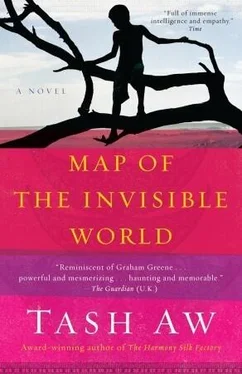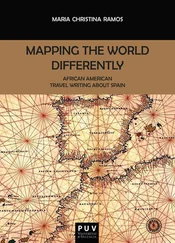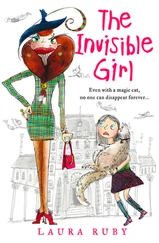Tash Aw - Map of the Invisible World
Здесь есть возможность читать онлайн «Tash Aw - Map of the Invisible World» — ознакомительный отрывок электронной книги совершенно бесплатно, а после прочтения отрывка купить полную версию. В некоторых случаях можно слушать аудио, скачать через торрент в формате fb2 и присутствует краткое содержание. Год выпуска: 2010, Издательство: Spiegel & Grau, Жанр: Современная проза, на английском языке. Описание произведения, (предисловие) а так же отзывы посетителей доступны на портале библиотеки ЛибКат.
- Название:Map of the Invisible World
- Автор:
- Издательство:Spiegel & Grau
- Жанр:
- Год:2010
- ISBN:нет данных
- Рейтинг книги:4 / 5. Голосов: 1
-
Избранное:Добавить в избранное
- Отзывы:
-
Ваша оценка:
- 80
- 1
- 2
- 3
- 4
- 5
Map of the Invisible World: краткое содержание, описание и аннотация
Предлагаем к чтению аннотацию, описание, краткое содержание или предисловие (зависит от того, что написал сам автор книги «Map of the Invisible World»). Если вы не нашли необходимую информацию о книге — напишите в комментариях, мы постараемся отыскать её.
comes an enthralling novel that evokes an exotic yet turbulent place and time—1960s Indonesia during President Sukarno’s drive to purge the country of its colonial past. A page-turning story,
follows the journeys of two brothers and an American woman who are indelibly marked by the past — and swept up in the tides of history.
Map of the Invisible World — читать онлайн ознакомительный отрывок
Ниже представлен текст книги, разбитый по страницам. Система сохранения места последней прочитанной страницы, позволяет с удобством читать онлайн бесплатно книгу «Map of the Invisible World», без необходимости каждый раз заново искать на чём Вы остановились. Поставьте закладку, и сможете в любой момент перейти на страницу, на которой закончили чтение.
Интервал:
Закладка:
“What do you mean?”
“With long necks and angular cheekbones. I mean, all of you do it. Walter, who really started this trend, I suppose, he paints them with thin, curving necks and seductive eyes — when he bothers to paint women at all, that is. Boys are really his thing, as you know. Rudolf is the same, though his women are a bit more interesting because they’re sinewy and lean, just like men. Which, of course, they are — men with breasts and feminine lips; he’s really quite repressed, Mother says, not at all like Walter. Jos Smit isn’t a homosexual — well, at least I don’t think he is — and yet he paints his women in the same way. And now you. You’re not all copying one another, are you?”
Karl turned to look at Margaret. His sand-colored eyebrows were clenched tightly in a frown. “Do you think my work is … derivative?”
“I wouldn’t say that, no,” said Margaret quickly, though she was aware, even as she said it, that she sounded less than convincing. “I mean, you have a wonderful sense of color. Look,” she waved a hand at the canvas, over the spot where patches of orange lay next to strips of absinthe green: the morning sun falling on the hills (or at least that was what she thought it was). “No one else in Bali does it this way. It’s really, um, unique.”
Karl returned to his canvas and began to dab some of the mud-colored paint into the outlines of the torso.
“So,” said Margaret, “do you think you’ll stay here in Sayan, then? For good, I mean. You know what? Your use of light is really very arresting. Wow.”
“Yes, I’ll stay,” said Karl, not looking up from his painting. “I don’t want to move anymore. This is my home now. I never want to move again.”
“Great.”
Karl set his brush down and turned to Nyoman, gesturing at her with upturned palms; the session was over for the day. “I like it here, I’m happy.” (He did not sound happy, thought Margaret.) “The people here like me and I like them. I like them very much.”
Nyoman rose from the platform and coughed some more. She came around to look at the painting and giggled, raising her hand to her mouth. “Poor thing,” Karl said, stroking her brow gently. “I don’t think she’s feeling very well, even though she protests otherwise.”
“Maybe she has tuberculosis,” said Margaret.
Karl looked anxious; he laid his palm on Nyoman’s forehead, checking for fever. “You think so? Just as well I’ve asked her to come and live here with me. I think it will be good for her — and for me. I need my muse near me.”
“That will be a cozy arrangement for everyone.”
He smiled weakly at Margaret. “I’m very optimistic about my new life here. I feel settled, after all these years. It’s just an instinctive thing. You understand, don’t you? I know you’re still a child, but somehow I feel we’re very similar.”
“Actually, I’m not sure I do understand.”
“Will you come and visit again? Soon?”
“Sure. Maybe. Yes, well, it’s not the easiest place for me to get to. Anyway, au revoir , as they say.”
“Au revoir.”
It was raining when Margaret arrived home. The journey had taken nearly two hours and the paths had become very muddy. She had slipped and fallen heavily on her shoulder and now her neck felt sore too. She was filled with a thick, insoluble despair, something so rich and dark that she thought it physiological: She felt nauseous, and there was a bitter taste in her mouth. Maybe she was catching a cold, she thought as she dried her hair and struggled out of her wet clothes. As she changed she noticed how small her clothes were — a child’s clothes. She hated them.
She found her mother in her study, sitting amid piles of photographs, all of which appeared to be of the same people — Balinese dancers who looked dead.
“No, they’re not dead,” her mother said, busily sorting through the prints in no apparent order. “They’re in a trance. Your father and I have been taking photographs of them. It’s going to be a very comprehensive record. What’s wrong with you? You look decidedly pale. I would ask your father to take your temperature, but he’s off somewhere with one of those amusing homosexual painters, hunting for butterflies. At least, that’s what he said. I hope it wasn’t a euphemism for something pederastic. I’ve just lately had a faint suspicion that he might be doing slightly more adventurous fieldwork than he’s admitted to, though of course that wouldn’t bother me in the slightest.”
“Mother, I’m not feeling very well.”
“What is the matter with you? You hardly ever get sick. There was that one time in Tchambuli when you were bitten by a viper and had convulsions, of course, but you’ve never been sick since. Let’s have a look at you. Why on earth are you crying? Oh god, it’s that silly thing young Westerners call love, isn’t it? Who is it? That delicate new Dutch boy? Listen, Margaret Bates, there’s only one thing I can tell you in these matters: Never allow yourself to become too attached to a man — or a woman, for that matter, though men seem somehow worse. I’ve seen this boy; he’s very engaging, but soon he’ll be gone. I don’t know if it’ll be one month or five, one year or five, but they all move on. Man is a restless creature, nomadic at heart. We all seek new experiences, and that’s the way it should be. Somehow it’s easier for the male animal to do it than the female, but if you remain truthful to yourself you’ll soon find that you are a nomad too. Don’t settle down, darling; your home is where you are. You’re in control. Not Karl de Willigen or anyone else. Falling in love is just a notion. You can control it like anything else. Now, do stop crying. Boil yourself some water and make a pot of tea. I have to press on with my trance dancers.”
That night seemed very long. Margaret lay in bed without moving, blinking in the darkness, arms laid flat beside her. She tried to remove all thoughts of Karl from her consciousness, filling her head instead with a steady blankness. The emptiness brought relief but not sleep. Sometime after midnight she heard her parents arguing, their raised voices puncturing the fragile peace of her nonsleep, and suddenly she could see an image of Karl in her mind’s eye; his slim hands and tawny hair, or his new house, perched precariously on the ridge. Or Nyoman. She could hear Karl’s lilting voice too, and then she’d have to start again, this conscious process of deleting each image one by one, extinguishing them each time they resurfaced, like figures from a shadow play that refused to die. Pull yourself together, Margaret Bates, she repeated; you can do it. There, you see? Falling in love is a matter of choice. Gradually she began to feel better and, sometime toward dawn, as sleep finally came to her, she felt herself falling out of love with Karl.
22
A dam lifted his head and blinked. Light was falling onto the floor in a stream of constant color. He looked up: A crystal chandelier hung above him, its sharp nose pointing toward him like a huge icicle that he feared would crash down upon him at any moment. The dark, shiny floor reflected the light, and when Adam looked down he could make out the blurry outline of his face and body. At first he did not recognize himself; he looked different, as if lost in another world where all shapes, all things, all people were altered, only a fraction, but enough for him not to be sure where he was. Every time he moved the light would change completely and half his body would be shaded; and if he turned his head slightly, part of the ceiling would suddenly shift and make him seem taller.
He was surrounded by beautifully dressed people — the men in Western-style suits or military uniforms, the women in long dresses that swept around their ankles. They were wearing jewels too, these women — necklaces and brooches and earrings the likes of which Adam had never seen before. He tried not to look, to keep walking steadily; the problem was that he did not know where he was going. Young men in hotel uniforms paused before him. He could tell that they wanted to ask him what he was doing there, but he knew that as long as he kept moving he would be safe. He needed to keep calm and act as if he knew this place.
Читать дальшеИнтервал:
Закладка:
Похожие книги на «Map of the Invisible World»
Представляем Вашему вниманию похожие книги на «Map of the Invisible World» списком для выбора. Мы отобрали схожую по названию и смыслу литературу в надежде предоставить читателям больше вариантов отыскать новые, интересные, ещё непрочитанные произведения.
Обсуждение, отзывы о книге «Map of the Invisible World» и просто собственные мнения читателей. Оставьте ваши комментарии, напишите, что Вы думаете о произведении, его смысле или главных героях. Укажите что конкретно понравилось, а что нет, и почему Вы так считаете.












